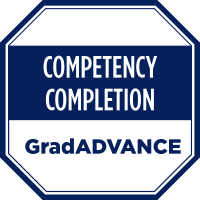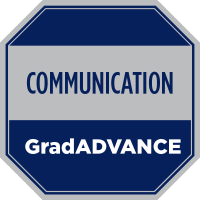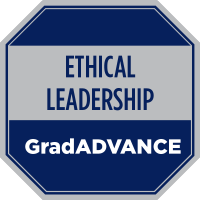GRADADVANCE

The Villanova GradADVANCE program is a unique professional development experience designed specifically for graduate students.
Throughout your graduate education – in the classroom, at programs around the university and in your work experiences – you will have opportunities to develop and advance essential skills and competencies that will set you up for lifelong success. With the GradADVANCE program, the Career Center, Center for Graduate Education & Research, and your academic department come together to help you identify, expand and articulate these skills and competencies so you are ready to bring them with you to the next career moves you’ll make – wherever you set your sights.
Skills and Competencies

Below are the six principal skills and competencies of the GradADVANCE program with definitions of each and how you can actively cultivate and enhance them. Keep an eye out on your Villanova email for curated lists of opportunities to explore these further throughout the academic year.
See the How to Engage with GradADVANCE section below to get started.

Maximizing your overall well-being allows you to perform at peak effectiveness in all aspects of your academic, personal and professional life. As a Villanova graduate student, you will learn how to access your power and passion through spirituality and a growth mindset to foster resilience and balance in your life.
- Prioritize well-being, individually and communally, in all of its dimensions to enable success in your life: academic, personal and professional
- Recognize and celebrate strengths in yourself and others, building self-confidence and the ability to bounce back from challenges
- Develop critical life skills to create the foundation for lifelong success and wellness

Graduate school is a time to focus on both your academic and professional life. As a Villanova graduate student, you will explore varied and diverse career options, create a uniquely Villanovan professional brand and build skills and strengths related to your career goals.
- Explore various industry and career opportunities and learn about diverse professional paths
- Build and expand your professional network
- Create your professional brand and develop a marketing plan to navigate future employment
- Prepare for the job search by incorporating best practices of job preparedness strategies
- Understand professional ethics and how to navigate organizational structures

As a Villanova graduate student, you will learn how to effectively communicate across the many channels required in today’s complex age of in-person and digital work. You will build your skills and abilities to communicate in all facets, including written and oral, formal and informal, in- person and virtual settings.
- Communicate data and research to non-specialist audiences and understand the difference between academic and non-academic writing
- Master presentation, storytelling and public speaking delivery skills
- Listen, interpret and share your ideas with confidence and clarity
- Hone skills in digital communication, such as with PowerPoint and other presentation platforms, and understand social media best practices
- Produce professional writing incorporating best etiquette standards: emails, cover letters, informational conversation requests and thank you notes

Villanova is committed to developing and supporting a diverse, equitable and inclusive community, where all members feel a sense of belonging. You will learn about, understand and apply strategies that foster inclusion and intercultural fluency while advancing equity within various professional contexts.
- Acknowledge, respect and welcome individual differences among people and teams, appreciating the value that diversity brings to communities and workplaces
- Create environments in which any individual or group can be and feels welcomed, respected, supported and valued to fully participate
- Develop awareness of and the ability to address equity issues, acknowledging policies, expectations and unspoken rules that contribute to inequalities in outcomes among different groups, particularly recognizing those who are underserved, underrepresented or marginalized

As a Villanova University graduate student, you will learn to lead by your actions and realize your leadership potential as more than your job title or position. You will recognize the way Augustinian values are foundational to being an ethical leader, develop discernment skills when analyzing complex problems and broaden your decision-making skills to consider courses of action that may not be governed by established rules, regulations or guidelines.
- Develop visions and long-term plans for teams and projects
- Refine your skills in giving and receiving feedback
- Address work-related issues and challenges with honesty, humility and compassion
- Scan environments and situations for potential conflicts of interest before making decisions
- Maintain open lines of communication with colleagues and teammates, acknowledging successes and learning from failures

All academic and professional careers require research knowledge and skills. Villanova graduate students will become skilled in accurate, effective and ethical research appropriate to their professions. You will learn to produce, disseminate and preserve knowledge for the good of all and to continually pursue truth. You will develop a deeper understanding of how creating new knowledge contributes to your own progress and serves the common good.
- Understand critical and analytical methods appropriate to your field of study, including best practices for making meaning of quantitative and qualitative data
- Structure research questions in pursuit of new knowledge that will be useful to others (e.g., your company, university and/or scholarly field, in addition to the broader public)
- Employ effective and ethical communication principles in the dissemination of results
How to Engage with GradADVANCE
We are proud to partner with Suitable, user-friendly software that allows graduate students to find and participate in activities across Villanova. Students will earn points for activities, event attendance, and accomplishments at various levels, ultimately resulting in earning badges for each competency and a final GradADVANCE program completion badge.
Students can get started today, earn points and build skills towards competency badge completion!
- Download the Suitable mobile app from your phone's app store or go to app.suitable.co on a desktop.
- Login with your university email address and password.
- Allow notifications from the Suitable App and ensure that you give the app access to your camera.
If you're having technical issues with the app, please try the following options:

